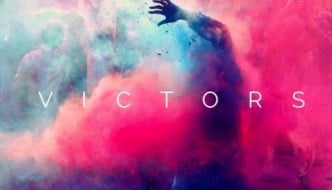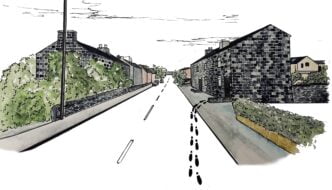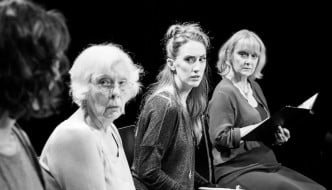[photo credit: tramlines.com]
Upon arriving in Sheffield on Friday afternoon, I caught up with Vincent Cavanagh – an original member of Liverpool’s Anathema – before their headline slot at Sheffield’s City Hall that evening. With a career spanning almost 25 years, I spoke to Vincent about inner-city festivals, the importance of production and the future of the band’s sound.
TSOTA: With inner-city festivals like Tramlines, Sound City and Live at Leeds growing in size and popularity, would you say you prefer this urban environment or a more traditional camping festival?
VC: As a punter I think these are better to be honest with you. There’s a big glut of mainstream festivals; there’s too many of them. There’s only one or two that are worth shouting about really – they’re all very much the same thing. Whereas with this, you’ve got totally different things. The one festival that looks interesting to me in terms of mainstream, major music festivals is Latitude. You’ve got everything at Latitude. It’s not just music: it’s theatre, it’s art, it’s performance, it’s dance, it’s comedy. The last time I came to Tramlines, a couple years ago, I saw 65daysofstatic in the Millennium Gallery and it was one of the most mind-blowing things I’ve seen anyone do. I mean it was more than just a band playing, it was kind of like an installation. There was this incredible sound system which consisted of 12 near field monitors so the sound was shooting round like a surround system. They did a load of stuff off the new album which wasn’t out yet so nobody really knew it, and alongside the visuals it just blew my head off. I saw it twice that day, it was that good. I’ve done a lot of performances in galleries before and I just love that crossover between art and music.
TSOTA: Would you say that the better half of a quarter century and 10 studio albums has pushed you more towards studio work or do you still prefer live shows?
VC: I really like both, but I do have more of a leaning towards studio work. The feeling you get when you’re writing music beats anything else; when you’re sitting on your own or with your mates and you come up with something. There’s nothing like it, it’s like discovering something for the first time. Once you know, you know. Getting out and playing those tunes is a completely different experience. It’s equally cool but rewarding in a different way. For me, I like the surprise and the unknown when you’re starting something and you don’t really know where it’s going to go.
TSOTA: To me, lots of bands that are at breakthrough level now, Slaves or Royal Blood for example, have a very defined yet finite sound. What would your advice be to bands like this to keep the music and song writing flowing?
VC: If you put yourself in a mould for more than two albums these days, people start to get bored, but that never seemed to be the case. Bands like AC/DC, when they started, were able to make album after album that was just AC/DC rock ‘n’ roll – Motorhead being the same – and there was no need for progression because they were giving the fans what they wanted, playing the music they wanted. With Royal Blood, maybe that’s what people want as well and if they do then I hope their fans stick with them as fans can be very fickle these days. I guess from our perspective, we’re in a lucky position because we’ve always wanted to change and we always have changed. Every one of our albums has been different from the last so now when we do our eleventh album, if we repeat ourselves that’s when people will get disappointed, like ‘hang on a minute are you out of ideas or what?!’
TSOTA: I’ve heard you say before that you greatly value the importance of production for a band and what this does to their songs. Alongside the fact that you worked in a recording studio from an early age, would you say that your engagement with production grew as a necessity or as a passion similar to that of playing music?
VC: For me it’s both. I’m bored of writing riffs; either sitting down in my room with a guitar or a piano. What I like to do is get in the studio or use my studio at home to tweak things and invent things and come up with my own sounds and beats. That’s what I was saying about this process of discovery, more often than not it’s like sitting down at a blank canvas and saying ‘what am I going to do today?’ and having absolutely no idea. If you’re sitting down with a guitar, you can quite easily fall back into familiar patterns and chord progressions that you’re used to playing. I’m not a proficient enough piano player to fall into my own patterns really so I just feel my way along. When you’re doing that with soundscapes and atmospheres you let those lead you along and that works for Anathema. Danny is your more traditional piano based riff writer and John comes up with a mixture between the two but I do the more out-there stuff.
TSOTA: Your most recent album, Distant Satellites, was recorded in Oslo. Would you say that you prefer the home studio environment where you live with the album, or a studio where you’re coming and going and getting advice off professionals?
VC: If you’re going to a studio everything should be ready. That includes all your beats, all your programming – anything that involves software should be prepared in advance. But when I’m going into the main studio I prefer that to be residential like a complete lock-out so you don’t clock off if you don’t want to. I prefer people not to go home afterwards and then come back, I want us all to be living there. It wasn’t like that in Oslo and it hasn’t been like that for a while but I want it to go back to that for the next record. I want to find a good studio in England and live in it.
TSOTA: Your sound as a band has changed dramatically over the years but there remains a sombreness and melancholy to your tracks. With the word ‘doom’ being strongly tied to the band can you see yourselves moving in even more dramatic directions towards something entirely different, something easy listening and ambient for example?
VC: What you’re talking about there is stuff in a major key. You can make things in a minor key sound uplifting and things in a major key sound melancholic and I like that kind of thing. If you’re going to go there do it with a bit of class. I’m not interested in happy-happy or easy-listening and the only thing we can do is to produce stuff that’s honest. It’s not all melancholy but around the time of our fourth album, Alternative 4, it was all bleak and it kind of reflected what we were going through at the time. Nowadays there’s still a lot of that going on, people still struggle through life in one way or another and that doesn’t really go away, it just comes out in the music. We haven’t chosen to play like this because it fits our style; it’s just the way it comes out.
TSOTA: Across your albums you have quite a few individual songs that act as different parts to the same title. With regard to your writing process, does this tend to be one song chopped up or a collection of tracks that fit together?
VC: We don’t really have rules to any of it. You can have a couple of things lying around and then like three years later you’ll have a brainwave and go, ‘that works with that’. Or you can put the top line melody from one thing and put it over the chords with this one and it just works. Sometimes you can write the whole thing in one go and it just flows naturally and you just automatically know what comes next. When you start off a song you might not have any idea where it’s going to go and then somewhere along the line it just occurs to you. Sometimes the tracks lead you along and tell you what they want. That’s one of the reasons we’ve got a lot of builds and different sections in our songs.
TSOTA: Your album, Hindsight, looks back at some of your older material with an acoustic approach, would you say that the name of this album suggests that you would have done things differently if you recorded the songs today?
VC: I think that at whatever stage you’re at, if an idea comes to you it can be totally different, whether that’s three days apart, three weeks apart or three years apart. I welcome the idea that songs can have more than one side. I don’t see the problem with a song having more than one life, especially if it’s the same person that’s written the song, I mean why the fuck not? No one minds it with electronic music, somebody will put a single out and there’ll be five different remixes of it and no one bats a fucking eye-lid. If you do it with rock music people ask ‘what are you ashamed of your past?! FUCK OFF’. There’s a track, Get Off Get Out, on We’re Here Because We’re Here and it’s turned out completely differently to the way I would have done it originally. It’s turned more into a rock song but if anything I want to go back and revisit Get Off Get Out and do it as I originally intended it with John and that’s going to be a fucking electronic track.
TSOTA: Falling Deeper similarly looks at Anathema’s back catalogue from an orchestral stance. Could you see yourself revisiting some of your older material with an electronic approach, something that has started to shine through on Distant Satellites?
VC: Interesting question but probably not. When we did the resonance tour, when we got Darren and Duncan back on stage that was a nod to everybody that we respect everything that’s in our back catalogue, this is what we were doing then. To go back again and reinterpret things a different way is possible but for us I think it’d just be overkill if we did that. As far as electronic stuff is concerned that’s always just going to be there now so we’ll just look to the future with that. The electronic side, the classical side, the rock side and the acoustic side are four different things that make up the band. One thing we haven’t done is a purely electronic release. If we did that we’d do some new stuff. Get Off Get Out might creep up on there and possibly Take Shelter but that’s just for me. Actually, maybe I’d just do them and not release them!
David Campbell Olson




Comments